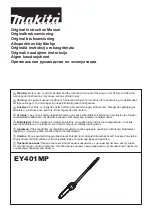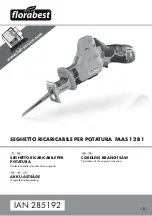
37
37
Operation
Plain sawing includes ripping and crosscutting, plus a few other standard operations of a
fundamental nature.
•
As with all power tools there is a certain amount of hazard involved with the operation and
use of the saw.
•
Using the saw with the respect and caution demanded as far as safety precautions are
concerned will considerably lessen the possibility of personal injury. If normal safety
precautions are overlooked or ignored, personal injury to the operator can develop.
•
It is good practice to make trial cuts using scrap material when setting up you saw for
operation.
Crosscutting
Crosscutting requires the use of the miter gauge to position and guide the work stock.
•
Place the work stock against the miter gauge and
advance both the miter gauge and work stock
toward the saw blade.
•
The miter gauge may be used in either table slot,
however, most operators prefer the left groove for
average work.
•
When bevel cutting (blade tilted), use the table
groove that does not cause interference of your
hand or miter gauge with the saw blade guard.
•
Start the cut slowly and hold the work stock firmly
against the miter gauge and the table.
•
One of the rules in running a saw is that you never hang onto or touch a free piece of work
stock.
•
Hold the supported piece, not the free piece that is cut off.
•
The feed in crosscutting continues until the work stock is cut in two.
•
The work stock is then slid sideways slightly away from the blade and then the miter gauge
and work stock are pulled back to the starting point.
•
Never pick up any short length of free work stock from the table while the saw is running.
•
A smart operator never touches a cut-off piece unless it is at least a foot long.
•
Never use the fence as a cut-off gauge when crosscutting.
•
Never use the miter gauge in combination with the rip fence.
















































